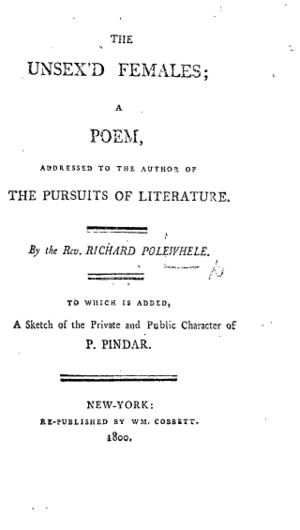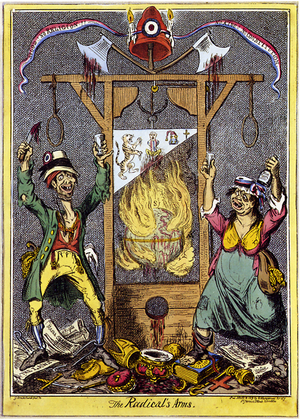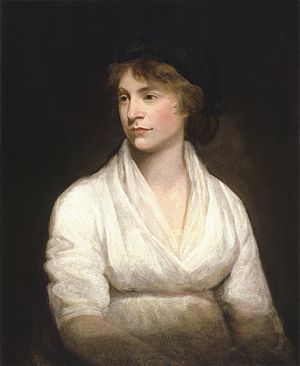The Unsex'd Females facts for kids

Title page from the 1800 New York edition
|
|
| Author | Richard Polwhele |
|---|---|
| Country | Britain |
| Language | English |
| Publisher | William Cobbett (orig. pub. Cadell and Davies) |
|
Publication date
|
1798; rpt. 1800 |
The Unsex'd Females, a Poem (1798) is a famous poem written by Richard Polwhele. It was published at the end of the 1700s, a time when people in Britain were having big discussions about what women's roles should be in society.
Polwhele's poem mainly talks about his worries that new, strong ideas from France were spreading into British society. These ideas came from a period called the Enlightenment, which focused on reason and individual rights. For Polwhele, a writer named Mary Wollstonecraft represented these new, revolutionary ideas.
This poem is interesting for anyone studying the history of women and how politics changed during this time. It shows how some people in Britain reacted against the ideas of the French Revolution. It also helps us understand the challenges women writers faced in the late 1700s.

What the Poem is About
The poem has 206 lines, written in a style called heroic couplets. This means every two lines rhyme and have a similar rhythm. What's special about this poem is that it has many footnotes. These notes are so long that they actually have more words than the poem itself! In these notes, Polwhele explains his points in more detail. He also makes sure his main goal, which is to argue his opinion, is very clear.
The poem has a simple structure. Polwhele compares two groups of women writers. The first group he calls the "unsex'd females." He uses "unsex'd" to mean un-feminine or not womanly. The second group includes women writers he sees as good examples. In the earlier parts of the poem, he also shares his general thoughts on how women should behave.
Why This Poem is Important Today
During his lifetime, Polwhele was not a very famous writer, even though he wrote a lot. After he died, not many people read his work. Today, some of his interests, like plants and fashion, might seem a bit funny to us.
However, The Unsex'd Females was part of a big "propaganda war." This was a time when people used writings to spread their ideas and influence others. The people involved took these debates very seriously. In the 1970s and 1980s, experts started looking at old writings in new ways. They decided that works shouldn't only be judged by how well-written they were. Because of this, poems like Polwhele's were "brought back" and studied again.
These poems have helped us understand more about the culture and politics of the time they were written. The Unsex'd Females is still very important today. It's a clear example of the strong political feelings during the revolutionary period in Britain.
Writers and Artists Mentioned
- Anna Laetitia Barbauld
- Diana Beauclerk
- Frances Burney
- Elizabeth Carter
- Hester Chapone
- Emma Crewe
- Mary Hays
- Ann Jebb
- Angelica Kauffman
- Catharine Macaulay
- Elizabeth Montagu
- Hannah More
- Ann Radcliffe
- Maria Elizabeth Robinson
- Mary Robinson
- Anna Seward
- Charlotte Turner Smith
- Hester Thrale Piozzi
- Helen Maria Williams
- Mary Wollstonecraft
- Ann Yearsley
 | Toni Morrison |
 | Barack Obama |
 | Martin Luther King Jr. |
 | Ralph Bunche |


